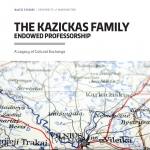News
The Kazickas Family endowed professorship at the University of Washington Baltic Studies Program has been a productive contribution to the Legacy of Cultural Exchange. "Your donation a decade ago transformed the Program," shares Andrew Nestingen, Chair of the Department of Scandinavian Studies at UW in his letter to Jurate Kazickas. "The Kazickas Family Professorship holds central importance among the ten Baltic Studies endowments."
It made it possible for the UW to establish a permanent faculty position devoted to research and teaching about Lithuania, Latvia and Estonia. Guntis Šmidchens, an Associate Professor holding this position, shares the latest accomplishment in Baltic Studies.
"In my book, The Power of Song, I surveyed the history of Baltic singing traditions from the 18th century to the successful end of the Singing Revolution in 1991. I am now working on a sequel, tracing out developments in Baltic singing traditions over the past 25 years of independence. Thanks to the endowment proceeds, I was able to travel to the Baltic several times in the past three years, attending choral events and festivals. During the course of these trips, I was able to be both an observer and a participant, learning firsthand by experiencing the singer’s point of view. I was also able to interview famous performers and festival organizers—a true boon to my research. The endowment proceeds have also paid for my travel to American and European conferences where I could present papers, compare my findings with other scholars and learn about the newest developments in the study of Baltic history, politics, literature and culture.
Thanks to money from the Kazickas Professorship, I will also be able to bring in guest lecturers. Among them are three young Lithuanian scholars who will “come to class” via Skype, presenting their views on the Lithuanian Seimas elections before, during and after the elections.
Lithuanian courses at the UW are continuing strong. This fall, new lecturer, Eglė Žūrauskaite, has six students in her first-year Lithuanian language class. Later in the academic year she will also teach a Lithuanian culture course in English, reaching out to a broader community of students. Students at UW study Lithuanian for a variety of reasons, from exploring their own ethnic roots to broadening their areas of specialization.
All of the wonderful developments—guest lecturers, expanded language offerings, growing numbers of students—revolve around the fact that the Scandinavian Department now has a tenured professor in Baltic Studies. And that professorship became a reality thanks to KFF generous gift. Thank you!"

